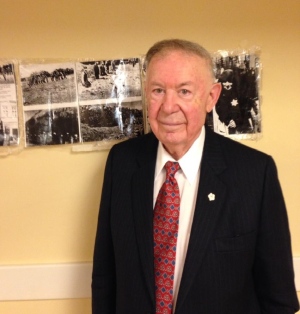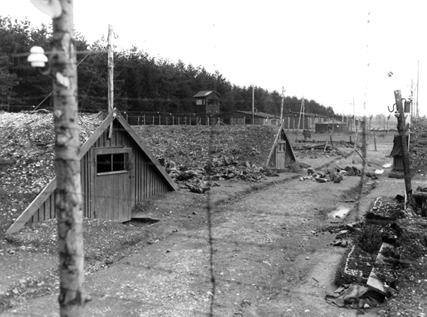This morning, I read in a CBS news story that Holocaust survivor Philip Riteman is still out on the lecture circuit, educating young students in Canada about the horrors of the Holocaust.
This quote is from the news article:
One of the last living Holocaust survivors in Atlantic Canada continues to tell his story, and says he worries the horrors he experienced could happen again.
It took four decades for Auschwitz survivor Philip Riteman to begin speaking about what he went through after he was captured by the Nazis when he was 14 years old.
The news article is very short, but it does give a hint that Philip’s story is worth some in-depth study. I recognized his name, when I read the news article, and I remembered that I wrote about him extensively on my website scrapbookpages.com many years ago: http://www.scrapbookpages.com/DachauScrapbook/DachauLiberation/PhilipRiteman.html
One of the interesting things about Philip’s story is that he was liberated on May 2, 1945 by American troops. This date identifies him as one of the prisoners who were marched out of the Dachau main camp toward the mountains of Austria in April 1945, just before the main Dachau camp was liberated..
The following information is from my scrapbookpages website:
Acting upon Hitler’s orders, the Commandant of Dachau, Wilhelm Eduard Weiter, made an attempt to evacuate the Dachau main camp before the American liberators arrived. On April 26th, 1945, Weiter left the Dachau main camp with a transport of prisoners bound for Schloss Itter, a subcamp of Dachu in Austria. Weiter allegedly committed suicide when the prisoners on the march were liberated by the Allies, but the truth is that he was probably shot by the Americans.
This quote is from my website page on Philip Riteman:
On November 10, 2005, Riteman gave a talk to College students in Regina, Saskatchewan, Canada; Keith Adolph took the following notes which he posted on his blog:
-Reitman went to school as a normal child in 1938
-Early on in the war it was seen as a fight against evil
-In 1939 Poland was invaded
-His father had ties to the Russian Gov’t and so they traveled to live under Russia and still it was not a good country to live in
-The Germans’ journey to Minsk took them through Reitman’s small town. For months they drove tanks through town
-They killed those in their way or caught watching them-The Nazis approached the mayor and demanded 10 kilos of gold and 20 kilos of silver or they would level the town. They took the money and left after a time.
-They returned and surrounded the town before asking for more. This time the town could not pay.
-Days later, at 3 AM, the Nazis came to the houses and took people from their homes. They separated children from parents and marched the 3000 residents 60 km. Others (about 5000) were driven.
-During the march they killed roughly 200 residents.
-Before releasing the residents the Nazis took 14 people aside, striped them and shot them dead, letting their bodies drop into 7 graves already dug.
-The residents were then freed and reunited with the others.-They were left in a small town that was entirely vacant.
-The village had been purged and the people were culled into a mass grave 50 x 100 and 7 feet deep
-En route they came upon a town and they were collected into a ghetto of 40,000.
-After Reitman’s group joined the ghetto, any person approaching the ghetto was shot.
The ghetto had no food.-Nine months later the ghetto was liquidated
-The residents were told they were being taken to a farm.
-They were all collected into 120 freight cars with all they could carry.
-The trains traveled for hours – all day
-A baby starved to death on the journey
-A man dropped dead and was pushed to the wall
-The train kept going
-The train traveled for 6 nights and 7 days.
-No food, No water
-People were soiling themselves where they stood
-One man was using a spoon to catch snow drops falling outside for water
-Reitman and the others were taken to Auschwitz-The doors were opened and everyone jumped out
-Reitman grabbed his little sister. Also in the car were his two brothers, his big sister and his parents
-The Nazis beat and pushed them onto a platform
-A woman chasing her baby was stabbed to death with a bayonet
-Reitman was told to pretend that he was 18 when the Nazis were dividing the Jews by age and gender.
-If you were 18-45 you had a chance of surviving
-Parents with their young children were taken straight to the gas chambers.-The Nazis began to divide the men by occupation
-Reitman pretended to be a locksmith
-The intellectuals were collected (about 300 of them) and machine gunned to death. The Nazis only needed workers.
-They were ordered to strip naked and shot if they moved too slowly.
-The Jews were shaved from head to toe.
-Body searches were conducted. Those caught hiding anything, even their gold teeth were executed.-If you spoke German in the camps, the Nazis would bring out ‘interpreters’ who beat you with sticks so that you would never speak German again.
-Hundreds of men were put into cold showers and then given striped clothes.
-They were given a bowl, no utensils.
-They were then tattooed.
-Over 2 million died at Auschwitz.
-They were made to march. If you refused, your legs were broken.
-The Jews marched better than the Nazis.
-The Nazis would lock them into their barracks each night.
-They fit 7 into each bunk.
-There were 125,000 men at Auschwitz [main camp] at this time.
-Only 20,000 were Jewish. The others were Russians, Gypsies, Blacks and so on.-Reitman spent 2 years at Auschwitz [main camp] and then 2 years at Dachau [subcamps]. In between he spent 6 months in Birkenau [AuschwitzII] where there were 2000 men to a barrack
-Smaller camps would kill their population and then call on larger camps to replenish their numbers. This is why Reitman moved around so much.-Reitman says he had to close his mind to survive. He was like a zombie.
-He learned to never be first or last in line. Always be in the middle.
-He lost five brothers, his parents, his grandparents. He lost nine uncles and nine aunts and many cousins.
-He was the only survivor in his whole European family.
-He could not talk about the camps or his family for forty years.“What kept you going?”
-If there is a God somewhere he will help me.
-He would have liked to have eaten one big meal and then died
-They ate one bowl of soup a day.
-If they had lost their bowl they were accused of sabotaging the Nazi Gov’t and beaten to death with sticks
-They wouldn’t waste the bullet.
-By comparison, the homeless today live in heaven. The Nazis burned them.
-If you limped, you were shot.
-Those who escaped got only 100-1000 feet and they starved to death.
-When they returned they were shot and burned by their fellow prisoners at the start of their day (5 AM)-After 6 months in the camp Reitman found an old class mate who was in the camps because he was a Baptist.
-The boy recognized Reitman and called out to him.
-The Nazis had wanted his family’s cattle but the boy’s father would not give it to them. He was shot.
-His mother attacked the Nazis and she was hung in the town center.
-His sisters were cut and raped and shot in the heart.
-His little brother was chased into the woods and shot.
-The boy joined Reitman’s work group on a farm and was instantly hated by the Nazis.
-One day he was stripped and put into a water trough. The Nazis took steel wool and tried to take his freckles off.
-The boy died in the trough which was full of his own blood.
-Reitman and the others had to take the boy back to camp to be burned.
-He was Reitman’s best friend.-Reitman was sent to another camp. When he arrived the barrack was full of all the dead.
-He and the others were forced to bury the bodies, but they were forbidden to pray.
-At another camp he spent a month in an airplane hanger.
-At Dachau the barracks were filled with bodies piled 7 ft high.
-When they tried to remove them the bodies came apart in their hands.
-These barracks were sunken into the ground[the barracks at the Kaufering IV camp were sunk into the ground – http://www.scrapbookpages.com/DachauScrapbook/DachauLiberation/KauferingIVLiberation.html ]
-They were marched for 2-3 weeks in the winter with only the snow to eat.
-Reitman estimates that 50,000 were killed for their weakness.
-They marched with tanks so that American planes would not bomb the convoys. The Jews wished they would though, just to kill the Germans.
-One night the camp was empty, not a German in sight. In the distance he could see the Americans coming, calling “You’re free!”
-This was May 2, 1945. Reitman was 18 years old and 75 lbs.-The Americans brought food and medicine.
-Reitman had never seen bananas before, or a coloured person.
-A coloured soldier taught him to peel bananas.
-He would drink 3-4 cans of milk a day-Reitman says he will never go back to the camps, but urges young people to visit them.
-He says he sees the camp every time he closes his eyes, even when he lived in Newfoundland.
-It would take Reitman 5 years to tell the story of his 5 years in the camps.-He cannot forgive or forget what happened. Only God can forgive.
-Reitman says he does not hate the Germans he met after the war. He only hates the Nazis-“I am speaking for millions who cannot speak”
-When he saw Americans he applied to go to the USA.
-The Red Cross took care of him in Europe and asked him about his history which they compared to his records held by the Nazis
-A month later he received a letter from Newfoundland from his mother’s sister.
-Then he got another letter from Newfoundland with 20 US $ in it.
-And then another from Montreal with 10 US $
-Then New York from his father’s sister and an uncle who had left Europe in 1890 and another in 1905.
-They were all relatives that he had never known to exist.
-In 1946 he was to come to Canada but the Canadian Gov’t would not allow Jews into the country.
-Newfoundland was not part of Canada at the time and they brought him right over.
-He traveled from Munich to Paris to New York to Newfoundland.
-He had never been on a boat before and he was very sea sick.
-The Newfoundland Gov’t said he was a free man. He was a Newfoundlander.
Most people would give the prize for the best Holocaust lies to Irene Zisblatt, but I think that Philip Riteman is a contender for this prize. He at least deserves an honorable mention in the list of Holocaust liars who have told the most egregious Holocaust lies.
From the details of his story, it is clear that Riteman was a political prisoner who was first sent to the Auschwitz main camp. He was not among the Jews who were rounded up in order to be “exterminated” at the Auchwitz-Birkeanau camp. Riteman was marched out of the Auschwitz camp, and taken to Dachau, where he was then sent to one of the sub-camps to work. He was brought back to the main camp, and then marched out of Dachau, on a march led by the Commandant of the camp, indicating that he was one of the prominent prisoners that the Nazis wanted to save.


